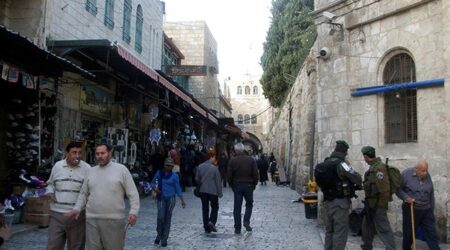Message in a Battle
It can be really disheartening to support Israel in San Francisco. Since I was old enough to reason, I have supported Israel actively: participating in debates at school with peers, university professors, and those who mistakenly assumed that I didn’t know my facts or would let my emotions get the better of me. Worst of […]

It can be really disheartening to support Israel in San Francisco.
Since I was old enough to reason, I have supported Israel actively: participating in debates at school with peers, university professors, and those who mistakenly assumed that I didn’t know my facts or would let my emotions get the better of me. Worst of all, like a glutton for punishment, I’ve been going to counter-rallies.
As a result, I’ve witnessed some of the most offensive and revolting behavior this side of Western Civilization. Forget distasteful imagery, gross exaggerations, or even plain old lies. You see, as soon as you enter the rally arena, you are no longer, say, a young Jewish woman with a differing viewpoint. You are the enemy entity. How else could you explain the vicious words that in any other situation a seemingly “open-minded” person would be ashamed to utter? I’ve had a man easily four times my then-fifteen years give me two middle fingers and some taunts, his face contorted by his hateful words. I’ve heard Jihad chanted in the street by men, women, and children. I’ve seen the police ignore a man armed with hammers banging on a makeshift drum yelling a simple, “Kill the Jews!” I was standing a few feet away and for some reason seemed to be the only one in the crowd who minded. I’ve seen elderly people and women (rarely strong men) physically attacked for standing on the wrong side of the protest. I have also been close to experiencing physical violence firsthand, because me and two other women walked away from the main counter-protest group and attracted the attention of two young and aggressive Arab men, who rushed across the street yelling angrily at us—that is, until they saw that we were flanked by five men lagging behind. Then they stopped abruptly, suddenly changed their tune, and started calling for “peace.” What convenient timing! Happy, “enlightened” shouts of, “Don’t believe the news, it’s controlled by the Jews!” is probably the most tame bit of anti-Jewish sentiment I’ve had the pleasure of encountering. Perhaps the most troubling issue is that this sort of behavior is not just frequent, it’s typical. I guess political disagreement brings out the best in some people.

Unfortunately, because of my, shall we say, unpleasant experiences in this “open-minded” city, I’ve learned, defensively, to expect the worst everywhere I travel—at least as regards Israel or the Jewish people. It certainly didn’t help disprove my jaded mindset to learn that, for example, despite the large Jewish population in Buenos Aires and the fact that the synagogue has been decreed a historic landmark, it has not received a penny for care or maintenance from the Argentine government. Not even for security, in a city that endured two extremely deadly bombings of the Jewish Community Center and the Israeli Embassy in the 90’s with 85 and 32 dead, respectively. To me, this seemed like a clear and hateful message made to a very vulnerable population.
So, somehow, it didn’t seem likely that the capital of the Catholic world would be just the place to restore my hope and spirits. My experience just goes to show that life loves to toy with its subjects and their naive expectations.
Rome, capital of Italy and home to the Vatican, is a city that on the outside, would appear to be torn between two political extremes. It is common, in the course of your wanderings, to find both Fascist and Communist graffiti in highly public areas. But, as is often the case, it is the smallest minorities that are the loudest in expressing their views. However, this put me somewhat ill at ease, just imagining some teenage boys driven to political fervor painting their party’s imagery on the walls, like gang symbols. To add to my discomfort, Italy has a population of between 0.8 to 1.5 million Muslims, compared to 650,000 Jews. So, I expected things to get more than a little uncomfortable as I got on the metro at night to attend the rally for Gilad Shalit at the Coliseum.
When I arrived, I probably looked like a lunatic. Seeing a crowd of around five thousand people[1], covered in Israeli flags, smiling, talking, waving signs, with not a swastika in sight, made me giggle wildly at no one in particular. I had the urge to come up to every person I met and ask them whether they were Jewish, why they supported Israel, and whether I could have a hug. I suspect they sensed my giddy enthusiasm and kept away. I can’t blame them.

The rally was organized by the Union of Young Jews of Italy for the four year mark of Gilad Shalit’s being captured by Hamas. The purpose to having it at the Coliseum was to make it part of a chain of cities in Israel and Italy that turned off the lights of a major monument to demonstrate solidarity with Gilad Shalit. As I found out, the Coliseum does not turn off the lights for just anyone. In fact, it is the only event that year to merit the honor, besides of course Earth Hour. Aside from turning off the lights, Rome had also made Gilad Shalit an honorary citizen a while earlier, so that it could legitimately join Israel in demanding his freedom. The mayor of Rome, Gianni Alemanno, was present and made a very stirring speech, comparing the kidnapping and murder of former Italian Prime Minister Aldo Moro by the Red Brigades, a radical Communist group, to the abduction of Gilad Shalit. I considered whether there would ever be a day in which Gavin Newsom would give such a heartfelt speech in support of Israel’s existence and decided that that day would come only when Israel would become the sole country in the world to produce fine hair gel products. Also present was the president of the Lazio region (where Rome is located), the president of the province, a well-known journalist and politician Giuliano Ferrara, the head Rabbi of Rome, and a handful of other politicians. However, the most surprising appearance of the night were the parents of Gilad Shalit themselves. The father, Noam, read a letter that he had written to his son and to the world. Needless to say, everyone felt the rage and pain of the father who is running out of time and options to save his son. After his speech, a short film was aired in which the children of a Roman Jewish school read a story out loud, which they had illustrated, that Gilad Shalit had written when he was nine years old. The story is about a shark and a fish who become friends despite the fact that they are natural enemies and their cultures and families forbid them to do so. Gilad Shalit, at nine years old, understood and felt more than his Hamas captors ever will.
As I walked through the crowd, I had an important though seemingly obvious realization—these people are the same as me. Sure, they have their own language, their own literature, culture, political scandals, strengths and weaknesses, but they are indefatigably supporting the same values and beliefs that I and many other Russian-speaking Jews are fighting for as well. I always knew this in theory, but I suppose that it took actually seeing this concept in action to fully grasp the effect. Perhaps this is why I was so moved by the smiling faces and the Israeli flags. It reassured me that even if things start to feel hostile and overwhelming the next time I am at a pro-Israel rally in the Bay Area, there are at least five thousand Romans who have my back.
Oh, and one more thing: how did Rome respond when faced with their own violent anti-Semitic attacks? Well, in October of 1982, an Arab gunman opened fire on a crowd leaving a synagogue on Yom Kippur in the Jewish Ghetto, killing a two-year old boy. The following day, Carabinieri, the Italian military police, created several permanent guard stations around the synagogue and made the nearby Piazza Gerusalemme home to a parking spot for a van invariably full of armed Carabinieri. This protection is there to this day. Now that’s a beautiful message.
[1]Micol Debash “Il pesciolino si mangiera’ lo squalo.” UGEI. 24 June 2010. Web. 20 Oct. 2010
Tatiana Sundeyeva enjoys travel, literature, puns, and anything with an unhealthy sugar content. And not necessarily in that order. She is a graduate of UC Berkeley where she got a degree in English with a minor in Italian.





